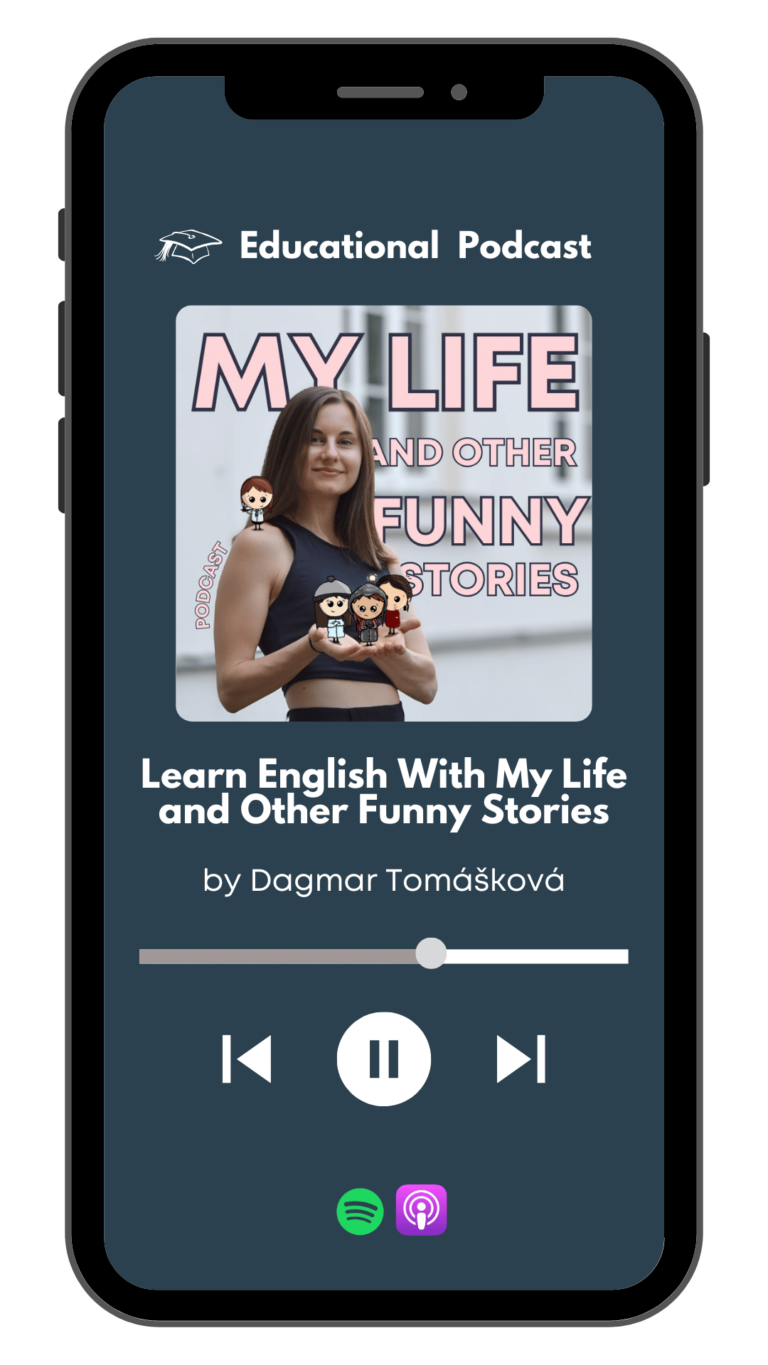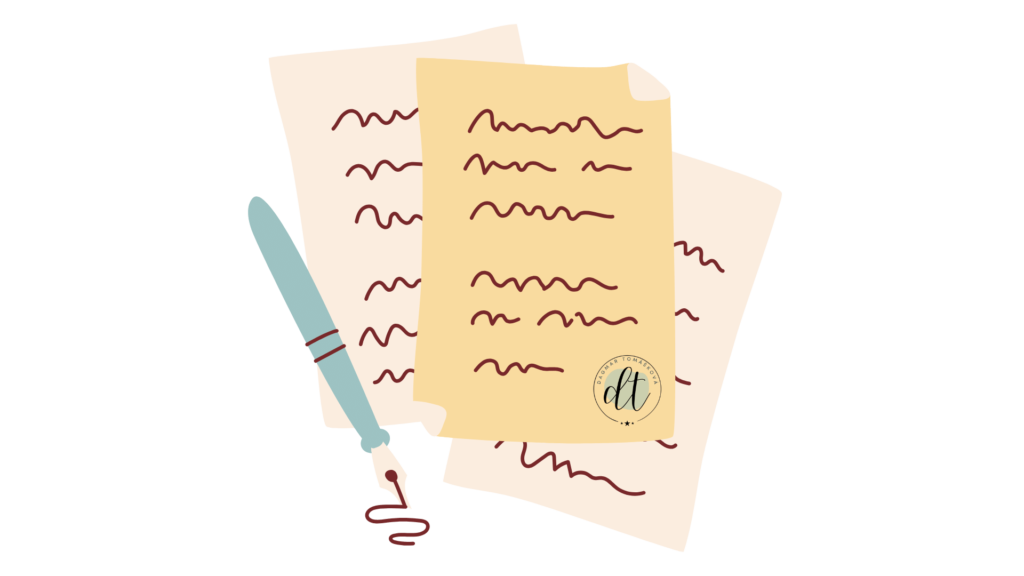
Ep.90: Expressions You NEED to Know to Understand Modern English
Today we’re talking about something that I think is secretly driving all English learners (and honestly, even native speakers) a little crazy. And that is… English expressions that appear in the vocabulary of the young generation out of nowhere and it takes a while to understand what they actually mean. The kind of phrases that, if you don’t know them, it is really hard to understand, why anyone would say them.

LISTEN TO THE EPISODE HERE:


WRITTEN TRANSCRIPTION OF THE PODCAST
Hello and welcome to my podcast My Life and Other Funny Stories. My name is Dagmar Tomášková. I’m an English tutor and coach, and I created this podcast for English students who want to improve their oral comprehension. As always, you can find the transcript of this episode and a vocabulary list in the notes of the podcast.
Today we’re talking about something that I think is secretly driving all English learners (and honestly, even native speakers) a little crazy. And that is… English expressions that appear in the vocabulary of the young generation out of nowhere and it takes a while to understand what they actually mean. The kind of phrases that, if you don’t know them, it is really hard to understand, why anyone would say them.
And I don’t blame you. Because some of these expressions are weird. And yet, they’re everywhere. Social media, conversations, memes, podcasts… so you need to at least understand them. Otherwise, you’ll be that person always asking, “Wait, what does that even mean?” And I don’t want that for you. I am your friend, always here to help, you know that.
Let’s look at some of these expressions together. I’ll explain what they mean and give you some examples. Are you ready? Say yes. Say it. Okay, let’s go.
Let’s start with:
- I can’t even
No, this isn’t a full sentence. That’s kind of the point. When someone says “I can’t even,” they mean they are overwhelmed by something. Usually emotionally. It can be in a good way or a bad way.
For example:
“This baby panda is so cute, I can’t even.”
Or:
“He said that again and I just… I can’t even.”
It’s basically like saying “I have no words” or “I’m so emotional or shocked that I can’t finish my sentence.” To be honest, I am guilty of using that one when I talk with my friends from the US, I can’t help it.
- Slay
This one used to mean “kill,” but now it’s a big compliment. If someone says “You slayed,” they mean “You did an amazing job,” or “You look incredible.”
Example:
“You slayed that presentation!”
“Girl, you slay in that dress.”
Honestly, I am wondering if you heard it because I can see it in every other comment on Instagram. But I can’t say it and mean it seriously.
- No cap
This means “no lie” or “I’m being serious.” It comes from African-American English and is super common on social media.
Example:
“This is the best pizza I’ve ever had, no cap.”
“She’s the kindest person I know, no cap.”
It’s a way of saying, “I’m telling the truth, I swear.”
- It’s giving…
This one is fun but also confusing. People use “it’s giving” to describe the vibe or feeling something has. It usually connects to pop culture or aesthetic.
Example:
“Her outfit is giving 90s supermodel.”
“This whole situation is giving drama.”
Or if your friend takes a really old-fashioned dress, you can say “it is giving grandma”.
You can just fill in the blank. It’s like saying “This reminds me of…” or “This feels like…”
- Sus
Short for “suspicious.” Originally it became popular because of the game Among Us. Apparently. I found this information on the internet, I have never played it. I am not really a game-lover.
But…If someone is acting weird or untrustworthy, you say they’re “sus.”
Example:
“He said he was at home but when I was walking by, his car wasn’t in his driveway. Very sus.”
- Main character energy
You know how in movies there’s the one person who the story is about? Well, in real life, when someone is confident, stylish, or acting like they’re in a movie about their own life, we say they have “main character energy.”
Example:
“She walked into the café like she owned it. Total main character energy.”
I think that this one is pretty cool because sometimes you just gotta remind yourself that you are the main character and that you should first and foremost take care of yourself and not other people. You should be your own biggest supporter.
- Lowkey / Highkey
Okay, I am overusing this one. If you say something is “lowkey,” you mean it’s kind of true, but you don’t want to make a big deal about it. “Highkey” is the opposite – you’re saying it loud and proud.
Examples:
“I lowkey want to quit my job.” (I don’t want to say it loudly, but I kind of do.)
“I highkey love this song.” (No shame, I love it.)
Lowkey is much more often used, though.
- Mood
This one is really short but really common. If someone posts a picture or a sentence that expresses how you feel, you can reply with “mood.”
Example:
Someone posts a photo of their dog lying on the floor, exhausted. You comment: “Mood.” It means “That’s exactly how I feel too.” You feel the same way as the dog. Do you get it?
Or someone says: “Oh, I just want to lie on the beach and drink a gin and tonic.” and I would say: “Mood”. That’s exactly what I would like to do now.
- I’m dead
This one is used when something is really funny. Like, “I’m laughing so hard I’m dead.” Not a literal death, of course.
Example:
“That meme? I’m dead. That was hilarious.”
- Periodt
It is spelled like period but then after the D we write T. Yes, with a “t.” It’s a strong way to end a sentence to show you mean what you said. It’s kind of dramatic. It doesn’t really change the way we say it, maybe we emphasise the T at the end but it is used in a written form a lot.
Example:
“She doesn’t need him. She’s doing great on her own. Periodt.”
It’s like saying “End of discussion.”
Now, if all of these make you feel like you’re learning a completely different language… you kind of are. Every generation creates new phrases to express feelings and their identity. To be honest, I personally, as I already mentioned, included some of those into my own vocabulary because I think they are lowkey funny and make you sound more natural. Sometimes I don’t even realize I am using them.
On the other hand…
Don’t feel like you need to use them all. Some of them will feel natural to you, others won’t. That’s okay. For example, you won’t even hear me say “no cap” seriously.
Also, try to understand them when you see them. Knowing the meaning is enough to follow conversations.
Thank you for listening. If you liked this episode, leave a five-star rating and share it with your friends. You can find the transcript and vocabulary list in the podcast notes. See you next time.

VOCABULARY LIST
out of nowhere – z ničeho nic
overwhelmed – zahlcený (emočně nebo mentálně)
guilty of doing something – být vinen (něčím), dělat něco často a vědět, že by se nemělo
incredible – neuvěřitelný
no cap – vážně, bez keců
vibe – atmosféra, dojem
aesthetic – estetický, vzhledový
suspicious – podezřelý
untrustworthy – nedůvěryhodný
main character energy – energie hlavní postavy (sebedůvěra a styl)
first and foremost – především
supporter – podporovatel
lowkey – potají, mírně
highkey – nahlas, naplno
literal – doslovný
hilarious – strašně vtipný